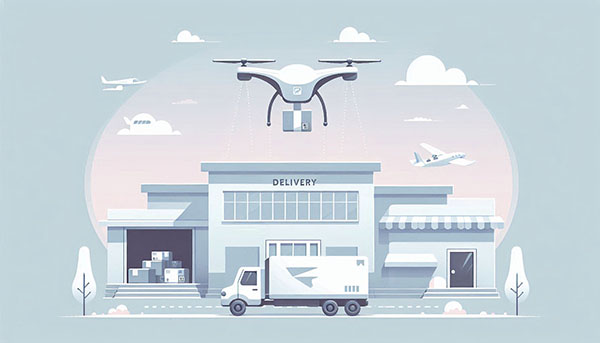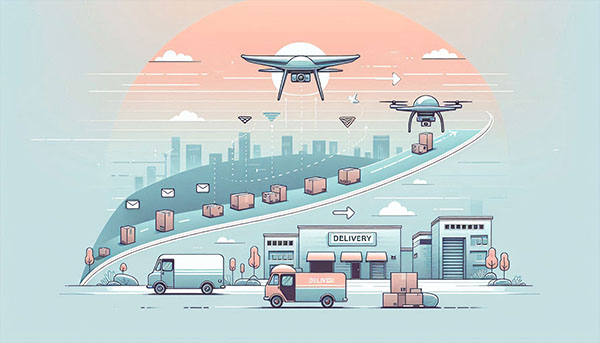By: John S. Morlu II, CPA
Imagine how fleeting life can be. Back in the late 1990s, a British market research company called WaffleCorp recruited an ambitious researcher named Alex Quibble and his friend, Catherine Gormish, to dive into the ever-expanding world of snack foods. Their mission was straightforward: scout out new tastes, identify market opportunities, and explore distribution channels from every corner of the globe. Little did they know that this seemingly ordinary task would lead them to an extraordinary discovery that would alter the course of snack history.
One crisp autumn day, Alex and Catherine found themselves in the vibrant city of Chicago, a metropolis known for its deep-dish pizza and thriving cultural scene. They often frequented Evanston, a charming suburb that housed the prestigious Northwestern University. It was in this academic and culinary haven that they stumbled upon a sight both surreal and revolutionary: a delivery van emblazoned with the name “Snappod.” The van was being driven by someone who looked suspiciously like a superhero in disguise, complete with a cape and a mask. This superhero wasn’t saving the world, however—he was delivering groceries.
Alex’s jaw nearly hit the pavement. “Did you see that?” Alex exclaimed to Catherine, eyes wide with disbelief. “Snappod is using dial-up Internet to deliver groceries! This is revolutionary!”
Catherine, ever the pragmatic voice of reason, glanced over and shrugged. “Yes, and so what?” she replied nonchalantly. “It’s just groceries. Who cares?”
But Alex wasn’t ready to let this moment pass. “We have to include Snappod in our write-up as a game-changer. This could be the key to revolutionizing snack distribution, especially for schools and universities.”
Determined to make their case, Alex dialed their boss, Mr. Crunchwell, a man infamous for his lengthy and meandering phone calls. After listening to Alex’s impassioned pitch about Snappod’s potential, Mr. Crunchwell responded in his typically dramatic fashion, “Don’t even think about coming to D.C. until you’ve had a meeting with the masterminds behind Snappod.”
And so, Alex and Catherine ventured out to meet the founders of Snappod—two eccentric individuals named Bob and Linda Sprinkles. Bob was a former tech geek with a penchant for retro gadgets, while Linda was a culinary aficionado with a flair for the dramatic. The Sprinkles had managed to merge the mundane task of grocery shopping with the thrilling world of dial-up technology, creating a business model that seemed as absurd as it was ingenious.
Bob and Linda were convinced that their model could revolutionize the snack industry. Their vision extended far beyond the confines of Evanston, aiming to bring grocery delivery to the masses. Their ambitious plan was met with a mixture of skepticism and admiration. Alex and Catherine were captivated by their unorthodox approach and infectious enthusiasm.
By the early 2000s, Snappod had attracted the attention of a major player in the retail world. The supermarket giant MegaMart, with its massive distribution network and deep pockets, acquired Snappod for what was reportedly a modest sum of $35 million. Although this amount seems trivial by today’s standards, it was sufficient to catapult Bob and Linda into the limelight, making them minor celebrities in the grocery delivery arena. And, as one might expect, Alex and Catherine didn’t receive so much as a token of appreciation for their pioneering insight.
Fast forward to the present day, and digital delivery services have become so ubiquitous that it’s hard to imagine life without them. The convenience of having virtually anything delivered right to one’s doorstep has transformed consumer behavior on a global scale. Companies like SnapCart, GrubHub, DoorDash, NoshHub, and Glovo in Ghana have led this revolution, each adding their unique touch to the food and grocery delivery industry.
SnapCart emerged as a frontrunner in grocery delivery, offering users an intuitive platform that combines speed with personalization. Their app doesn’t just fulfill orders—it predicts needs based on past purchases, ensuring users never run out of essentials. GrubHub has similarly revolutionized restaurant delivery, connecting customers with local eateries through a streamlined app that simplifies ordering. Its extensive network spans from small bistros to large chains, making it a staple in urban and suburban areas alike.
DoorDash, with its expansive reach across cities in North America and beyond, has made food delivery more accessible than ever. Known for its efficient logistics and fast delivery times, DoorDash has expanded into grocery and alcohol delivery, showcasing the versatility of the digital delivery model. NoshHub, a key player in emerging markets including parts of Africa, has tailored its services to local needs, offering delivery options ranging from fresh produce to hot meals. Its success in Ghana highlights how digital delivery can cater to diverse markets with varying demands.
Globally, Glovo has made significant strides, particularly in regions like Spain, Italy, and Ghana. Its delivery scope extends beyond food to include pharmaceuticals and personal care products, reflecting the expanding range of what can be delivered.
Adding to this ever-expanding landscape is retail giant Amazon, which has transformed the delivery industry by offering a comprehensive array of products, from groceries and electronics to clothing and household goods. Amazon’s entry into the market, marked by its innovative logistics approach—including advanced algorithms and drone delivery trials—has pushed the boundaries of on-demand services.
What started with Snappod’s dial-up dream has burgeoned into a global industry worth billions. The once-novel concept of grocery delivery has evolved significantly, driven by technological advancements and growing consumer demand for convenience. Today, the industry encompasses every conceivable type of food and product delivery service, from meal kits and restaurant takeout to groceries and niche products like artisanal cheese or specialty ingredients.
The impact of this industry expansion is profound. It has not only changed the way people shop and eat but has also spurred economic growth and created countless jobs. Managing a vast network of delivery services requires sophisticated technology and efficient infrastructure, leading to innovations in supply chain management and data analytics.
Furthermore, the rise of digital delivery services has accelerated the development of related sectors, such as packaging and last-mile delivery solutions. Companies are continuously seeking new ways to enhance the customer experience, whether through eco-friendly packaging, faster delivery times, or personalized service options.
In addition to convenience, the digital delivery boom has sparked discussions about sustainability and its environmental impact. As the industry grows, there is increasing focus on reducing the carbon footprint of delivery operations. Companies are exploring electric delivery vehicles, optimizing routes to reduce emissions, and incorporating green practices into their logistics strategies.
The evolution from Snappod’s modest beginnings to the current digital delivery landscape highlights the dynamic nature of innovation and its capacity to reshape industries. What started as a pioneering idea has grown into a global phenomenon, illustrating how an initial spark of creativity can ignite a transformative movement. As digital delivery services continue to advance, they will undoubtedly introduce even more changes and opportunities, further embedding themselves into the fabric of modern life.
The lesson here is both clear and cautionary: recognizing potential markets can be a tricky business. While Alex and Catherine had the foresight to see the revolutionary nature of Snappod’s concept, they failed to anticipate the broader implications of their innovation. Had they thought more expansively, they might have foreseen the rise of meal delivery services catering to every niche imaginable—from gourmet pet food to artisanal toilet paper. The scope for innovation was vast, and yet, they missed the opportunity to capitalize on it.
As someone who has always thrived on tackling challenges—often driven by a blend of unbridled optimism and a relentless drive—Alex now faces an exhilarating new chapter. With a burgeoning list of innovative ideas waiting to be brought to life, Alex is undeterred by previous setbacks. Instead, he is embarking on an ambitious new venture: creating a platform designed to package and sell these concepts to those who lack the expertise to turn visionary ideas into scalable, profitable realities.
The world is indeed overflowing with brilliant ideas and groundbreaking innovations. Yet, the true challenge lies not merely in the conception but in the nuanced art of packaging and execution. Many potentially transformative ideas have fallen by the wayside, not due to a lack of merit or ingenuity, but because they were inadequately presented or poorly executed.
Alex’s journey with Snappod has imparted a crucial lesson: turning a whimsical concept into a thriving business demands more than just a spark of creativity. It requires a daring vision, a strategic approach, and a touch of serendipity. The process of turning ideas into successful ventures involves an intricate dance of market understanding, effective presentation, and strategic execution.
By launching this new platform, Alex aims to bridge the gap between innovative ideas and successful implementation. His goal is to provide a robust framework that not only highlights the potential of each idea but also guides it through the complex process of execution. This platform will serve as a conduit for transforming abstract concepts into tangible, market-ready solutions, helping to ensure that promising ideas do not languish in obscurity but instead flourish into impactful, profitable enterprises.
Alex’s commitment to this new venture is fueled by his belief in the power of well-executed ideas. His vision is to create a thriving ecosystem where innovative concepts are nurtured, refined, and successfully launched, ultimately contributing to a landscape where creativity and execution go hand in hand.
In conclusion, the tale of Snappod stands as a strikingly memorable parable about the unpredictable nature of innovation and its profound impact on industries. From its modest inception in the quaint surroundings of Evanston to its surprising acquisition by the retail giant MegaMart, Snappod’s journey underscores a powerful lesson: even the most unconventional ideas have the potential to revolutionize entire sectors.
The story of Snappod, with its quirky reliance on dial-up technology for grocery delivery, serves as a satirical yet profound reminder of how seemingly eccentric concepts can indeed reshape the landscape of commerce. What began as a whimsical experiment in grocery logistics blossomed into a global phenomenon, proving that innovation often thrives at the intersection of audacity and imagination.
As Alex embarks on new ventures, the legacy of Snappod offers valuable insights. It highlights the importance of not only recognizing opportunities but also seizing them with both foresight and determination. The journey from idea to industry disruptor requires more than just a flash of brilliance; it demands a relentless drive to navigate challenges and turn visions into reality.
In the fast-evolving world of business, where trends shift and technologies advance, Alex’s path forward will be shaped by this understanding. Whether pioneering the next breakthrough in delivery services or venturing into entirely new markets, the essence of success lies in the ability to envision potential and possess the resolve to bring those visions to life.
The saga of Snappod is not just a story of quirky innovation; it is a testament to the transformative power of bold ideas and the relentless pursuit of turning them into tangible successes. It serves as a reminder that behind every groundbreaking achievement lies a blend of creativity, courage, and the unyielding will to forge ahead.
Author: John S. Morlu II, CPA is the CEO and Chief Strategist of JS Morlu, leads a globally recognized public accounting and management consultancy firm. Under his visionary leadership, JS Morlu has become a pioneer in developing cutting-edge technologies across B2B, B2C, P2P, and B2G verticals. The firm’s groundbreaking innovations include AI-powered reconciliation software (ReckSoft.com) and advanced cloud accounting solutions (FinovatePro.com), setting new industry standards for efficiency, accuracy, and technological excellence.
JS Morlu LLC is a top-tier accounting firm based in Woodbridge, Virginia, with a team of highly experienced and qualified CPAs and business advisors. We are dedicated to providing comprehensive accounting, tax, and business advisory services to clients throughout the Washington, D.C. Metro Area and the surrounding regions. With over a decade of experience, we have cultivated a deep understanding of our clients’ needs and aspirations. We recognize that our clients seek more than just value-added accounting services; they seek a trusted partner who can guide them towards achieving their business goals and personal financial well-being.
Talk to us || What our clients says about us


















